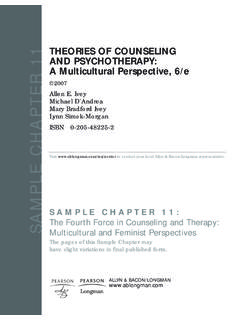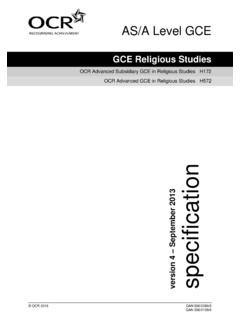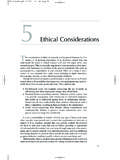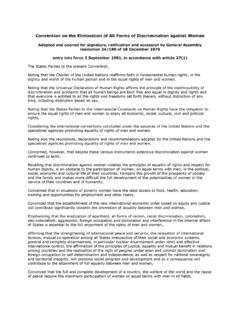Transcription of Susan Moller Okin: A New Zealand tribute ten years …
1 Women s Studies Journal, Volume 28 Number 2, December 2014: 93-102. ISSN 1173-6615 2014 Women s Studies Association of New Zealand Hosted at Moller okin : A New Zealand tribute ten years onJUDITH GALTRYI ntroductionIn January 2014, New Zealand s then Parliamentary Speaker David Carter announced his in-tention to undertake a review of M ori protocols in Parliament. The rationale, according to Carter, was that Parliament needs a protocol that is modern and acceptable to a diversified Parliament ( Speaker calls for M ori protocols to be modernised , 2014). The review, under-taken with the guidance of Te Atiawa and other iwi, was in part prompted by an incident in July 2013 where two senior female Members of New Zealand s Parliament (Parliament s long-est serving woman Member Annette King and her Labour Party colleague Maryan Street) were asked to move from the front bench during a powhiri (M ori ceremonial welcome) at New Zealand s Youth Parliament.
2 They subsequently raised their concerns with the New Zealand Parliamentary Speaker as an issue for the New Zealand House of Representatives to consider (Borissenko, 2013). Some claim that such a review is long overdue ( A woman s place , 2014; Speaker s look at Maori rules overdue , 2014) coming as it does on the back of calls from var-ious high profile New Zealanders over recent years for gender inclusiveness and equal treat-ment in civic spaces. One New Zealander who doubtless would have been very interested in these debates is the late feminist political theorist Susan Moller okin . Although okin became an academic super-star in the United States where she spent most of her career, in New Zealand , her birth country, she remains relatively unknown. okin helped to pioneer the study of feminist political theory, breaking new ground in her various works, which included a large number of articles and several books.
3 Her work received much international acclaim, especially in the United States, and was generally regarded as groundbreaking. But it was her 1997 essay Is Multiculturalism Bad for Women? that proved most contentious. In this essay okin explored the implications for women of the claims of some minority cultures to group rights. okin was a brave and independent thinker whose contribution to feminist thinking has been, I would argue, insufficiently recognised in her homeland of New Zealand . The year 2014, the tenth anniversary of her death in Lincoln, Massachusetts, thus seems a fitting time to pay trib-ute to her in New : okin s early life in New ZealandSusan okin , n e Moller , was born in 1946, the youngest of three daughters, in a state house in Auckland s wealthy suburb of Remuera. Her New Zealand mother became a fulltime house-wife upon marriage, as was then the norm.
4 Her Danish-born father worked as an accountant at Holeproof Woollen Mills. Susan was taught by her elder sister Catherine to read at a young age while convalescing from a childhood She attended Remuera Primary and Intermediate schools, followed by Epsom Girls Grammar from 1959-1963. A high flyer and an academic all rounder, Susan was a prefect and the recipient of several prizes and awards including for 9394 Judith GaltryWomen s Studies Journal, Volume 28 Number 2, December 2014: 93-102. ISSN 1173-6615 2014 Women s Studies Association of New Zealand Hosted at , English, history, music and art. In her final years at Epsom Girls Grammar she was awarded a John Williamson Scholarship to assist girls with an excellent academic record to undertake tertiary okin s academic career was stellar. Having graduated with a bachelor s degree in history from Auckland University in 1966, she was awarded a scholarship to attend Oxford University.
5 There she completed an MPhil in politics in 1970, before going on to obtain a PhD in govern-ment at Harvard in 1975. For the next 15 years , she taught at Brandeis University, Massachu-setts (Hoffman, 2004; Squires, 2004; Trei, 2004). In 1990, okin moved to California to take up the position of Marta Sutton Weeks Professor of Ethics in Society and Professor of Political Science at Stanford University, posts which she held until her death in 2004. Between 1993 and 1996 she was also director of Stanford Uni-versity s Ethics in Society Program. At the time of her death, okin was undertaking a one-year fellowship at Harvard University as a recipient of the Marta S. Horner Distinguished Visiting Professorship at the Radcliffe Institute for Advanced Study. okin was the author of numerous articles and book reviews, as well as books on feminist political philosophy. These included Women in Western Political Thought ( okin , 1979); Jus-tice, Gender, and the Family ( okin , 1989), and Is Multiculturalism Bad for Women?
6 (Cohen, Howard & Nussbaum, 1999). During her career, she received various distinctions and awards for her scholarship and writing. okin was interested not in abstract theory for its own sake but rather in the theorising of re-ality (Satz & Reich, 2009). Her key intellectual claim was that gender issues should be central and not, as had previously generally been the case, peripheral to political theory. In her first book, Women in Western Political Thought, which examined the classical theories of Plato, Ar-istotle, Rousseau and Mills, okin asked whether the existing tradition of political philosophy can sustain the inclusion of women in its subject matter [on the same terms with men] and, if not, why not? (p. 4). Her 1989 book Justice, Gender, and the Family is a critique of modern theories of justice ( okin , 1989). According to okin , traditional political theory has been written from a predomi-nantly masculinist perspective.
7 A primary concern for okin was the way in which sexist values continue to be reproduced and promulgated through the socialisation of children within the family setting. For this book, okin was a co-recipient of the American Political Science Asso-ciation s Victoria Schuck Award for the best book on women in politics. But it is her last significant and perhaps best known piece of work, Is Multiculturalism Bad for Women? that is the main focus of this article. Of all her work this piece was arguably the most controversial, and inspired not only acclaim but also significant debate and Is Multiculturalism Bad for Women? Is Multiculturalism Bad for Women? began as an essay by okin originally published in the Oc-tober/ November 1997 issue of Boston Review ( okin , 1997). It was later revised and reprinted in 1999 as the feature essay in an edited collection (Cohen, Howard & Nussbaum, 1999), and it is this 1999 publication that is referenced here (as Multiculturalism).
8 In this essay, okin (1999a) posed the central question: What should be done when the claims of minority cultures or religions clash with the norm of gender equality that is at least formally endorsed by liberal states (however much they continue to violate it in their prac-tice)? (p. 9). Moreover, queried okin , are the conflicts between the feminist commitment to gender equi-ty and the wish to support customary practices of minority cultures irreconcilable? According Susan Moller okin tribute 95 Women s Studies Journal, Volume 28 Number 2, December 2014: 93-102. ISSN 1173-6615 2014 Women s Studies Association of New Zealand Hosted at okin , in the context of liberal democracies, a focus on maintaining cultural diversity should not be at the expense of supporting unequal and unjust gender roles. okin outlined various oppressive gendered practices in many traditional cultures, such as female genital mutilation, polygamy, and punishing women for being raped (including through forced marriage).
9 She addressed women s greater likelihood of being subject to violence and their lesser access to education and political participation. She noted: I think we especially those of us who consider ourselves politically progressive and opposed to all forms of oppression have been too quick to assume that feminism and multiculturalism are both good things which are easily reconciled. I shall argue instead that there is considerable likelihood of tension between them more precisely, between feminism and a multiculturalist commitment to group rights for minority cultures ( okin , 1999a, p. 10). okin (1999a) argued that those liberals who support certain oppressive gendered practices as intrinsic, or even essential, to a particular minority group s cultural traditions mistakenly regard other cultures as monoliths and fail to recognise that, as with the dominant culture, minority cultural groups are themselves gendered, with substantial differences of power and advantage between men and women (p.)
10 12). In line with her previous work, in Multiculturalism okin (1999a) pointed out that tradi-tional political theorists tend to overlook the importance of the private sphere as the context in which persons senses of themselves and their capacities are first formed and in which culture is first transmitted the realm of domestic or family life (p. 12). It was her contention that the distribution of responsibilities and power at home has a major impact on who can participate in the public sphere, which is where a particular culture s rules and regulations are made. okin s Multiculturalism essay received much attention, including both acclaim and criti-cism. In 1999, Princeton University Press published an edited anthology based on and com-mencing with this essay (Cohen, Howard and Nussbaum, 1999). This anthology included fif-teen contributions (all but four of which had been published earlier in the Boston Review) from leading international thinkers on feminism and multiculturalism.







